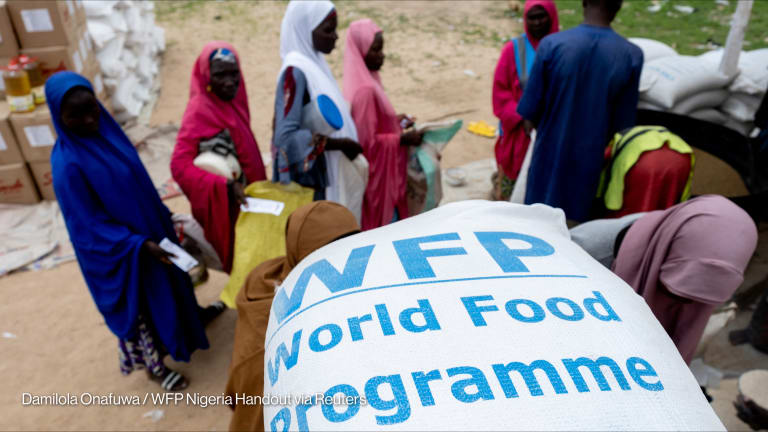
No matter where you look, it is hard to ignore the fact that alternative realities are having their moment. Multiverses, metaverses, deep fakes, and artificial intelligence are warping our perception of the world around us and making it hard to distinguish fact from fiction.
But as governments, civil society, and global institutions gather in Rome this week for the 2023 United Nations Food Systems +2 Stocktaking Moment, minds are focused on the real-world sustainability and food insecurity crisis. The Stocktaking Moment — convened to discuss bold action for our planet’s food systems — is less “Everything. Everywhere. All at Once” and more “Sustainability. Immediately. Here and now.”
Sustainable, equitable food systems are critical for both people’s and the planet’s survival. They provide sustenance to families, employment to communities, and are on the frontline of the fight against climate change. But our global food systems are also teetering on the edge of collapse — and if they do, humanity’s very future is threatened. We know that in as few as 30 years, rising temperatures and changing precipitation patterns will have rendered many regions unsuitable for growing essential crops such as bananas, coffee, avocados, and cashews.
Banana producers in the Caribbean and Central America are braced for scarcer rainfall and more extreme temperatures, while their fellow growers in Southeast Asia and Oceania face an increased risk of tropical cyclones. At the same time, coffee farmers in key regions such as Brazil, Indonesia, Vietnam, and Colombia could soon encounter temperature spikes combined with drought, dramatically reducing coffee production by up to 50%. In India and Benin, rising temperatures could deprive farmers of most of the farmland suitable for cashew production.
Navigating climate impacts
Climate impacts will inevitably trigger a host of environmental, social, and economic consequences. Countries whose economies rely on cash crops will suffer a drop in income. Forests and protected reserves will be at risk of deforestation as farmers seek more productive land. The livelihoods of entire communities will be threatened. Food systems will face significant upheaval — not just in producer origins but also in consumer countries.
Such disruption may be imminent, but it is not inevitable. By proactively adopting sustainable and resilient production models, we can avoid and mitigate many adverse climate impacts while simultaneously boosting the chances of achieving the Sustainable Development Goals. This means transitioning to more sustainable ways of agricultural production which account for, and adapt to, the needs of farmers, their communities, and their local environments.
Agroecology, key to sustainable food systems
At Fairtrade, we firmly believe that a sustainable future starts with sustainable food systems. That’s why we’re launching our new sustainable agriculture policy, which embraces agroecological principles and will enable two million Fairtrade farmers and workers to work in a way that benefits us all while helping to deliver Agenda 2030. It applies to food crops, fiber crops, and plants.
Agroecology — the application of environmentally and socially responsible principles to farming — may be the buzzword of our time, but it has been embedded into Fairtrade’s ethos since we were founded more than 30 years ago. Our origins, mission, and vision explicitly address themes such as climate change, farmers’ autonomy, land stewardship, and food security, as well as nutrition, biodiversity, and social justice — all essential elements for successfully achieving the SDGs.
Agroecology also embraces other core Fairtrade principles, such as the empowerment of vulnerable or marginalized populations in rural areas. Most importantly, it is a holistic approach that takes into consideration all the ecological, social, and economic dimensions of our food systems and the changes needed to render them truly sustainable.
In relation to SDG 13 on climate action, Fairtrade already supports co-ops, farms, and plantations with training, funding, partnerships, and access to finance and expertise as they seek to adapt to and mitigate the effects of climate change. Our new agroecology policy will include renewed, intensified efforts to help farmers and their organizations reduce their water footprint, bring down greenhouse gas emissions, and generate new sources of revenue, including ones associated with carbon removal units.
When it comes to sustainable economic growth and decent work — SDG 8 — the social side of agroecology will see Fairtrade increase its work on youth employment and decent livelihood opportunities, ensuring that sustainable food systems and farming as a whole are viable career options for young people in rural communities. Food systems will only be sustainable if farmers are willing and able to continue to farm. Fairtrade will continue to champion the creation of safe and respectful workplaces for young people and foster their participation in decision making so that sustainable farming can be preserved for future generations.
SDG hunger goal slumps further behind 2030 target in key UN food report
Although the number of hungry people is stabilizing, the world is still not on track to meet the goal of eliminating hunger by 2030, according to the U.N.’s flagship global food security report.
It’s not just farmers and their families who will benefit from Fairtrade’s focus on agroecology. We will continue to fight, not only for sustainable production but for sustainable consumption — SDG 12 —, fairer markets and fairer, more transparent and accountable supply chains. Information about pricing and terms of trade, for example, will reduce power imbalances and build a more equitable food system for all, while giving consumers the information they need to make ethical choices.
We believe that our new approach to agroecology is essential for a sustainable food system. It is at the core of Fairtrade’s vision for a sustainable future and for achieving the SDGs. In fact, there is barely a single one of the 169 different SDG action points that isn’t somehow related to food and farming. This means that the goals will only be delivered successfully if smallholder farmers and agricultural workers play a central role in their planning and implementation.
At the halfway point to Agenda 2030, the U.N. Stocktaking Moment provides the international community with an opportunity to make a final push toward a truly sustainable planet. But that won’t happen without a more sustainable food system built on holistic ecological, social, and economic foundations. We are confident that Fairtrade’s new agroecological approach will help lay those foundations for farmers, farm workers, businesses, and consumers — because a sustainable future must also be a fair future.
Read more about Fairtrade’s work on sustainable food systems.









